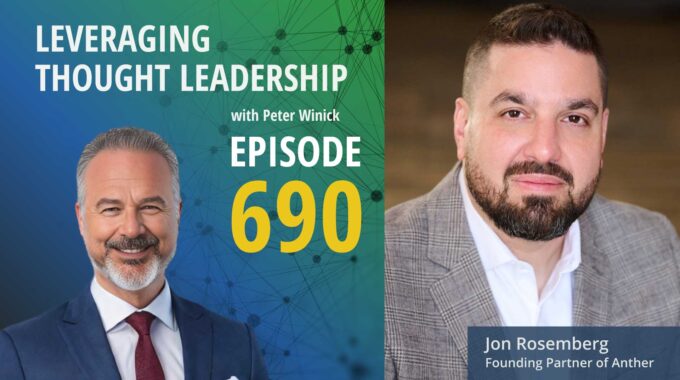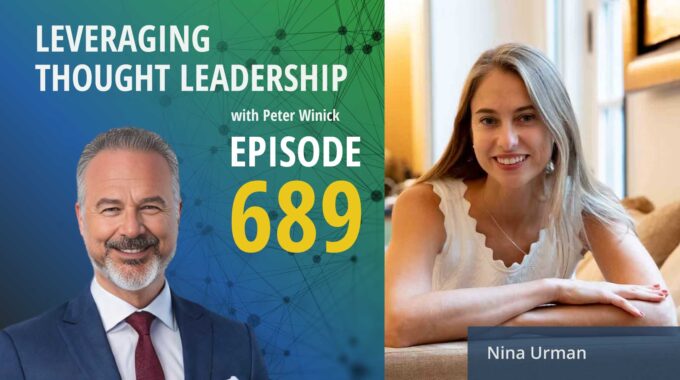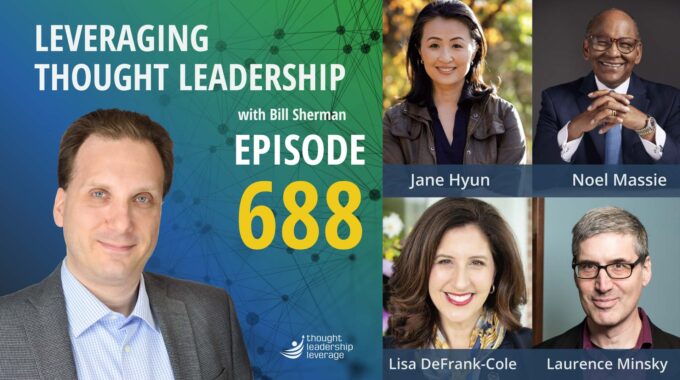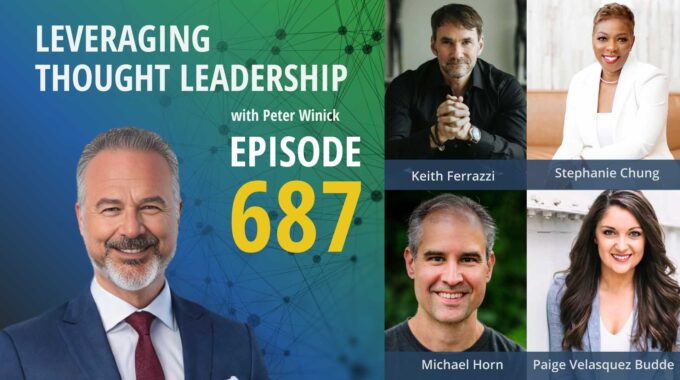A practical framework for leaders who want clarity and performance This episode defines thriving at…
From Basketball to Books | Owen Sammarone
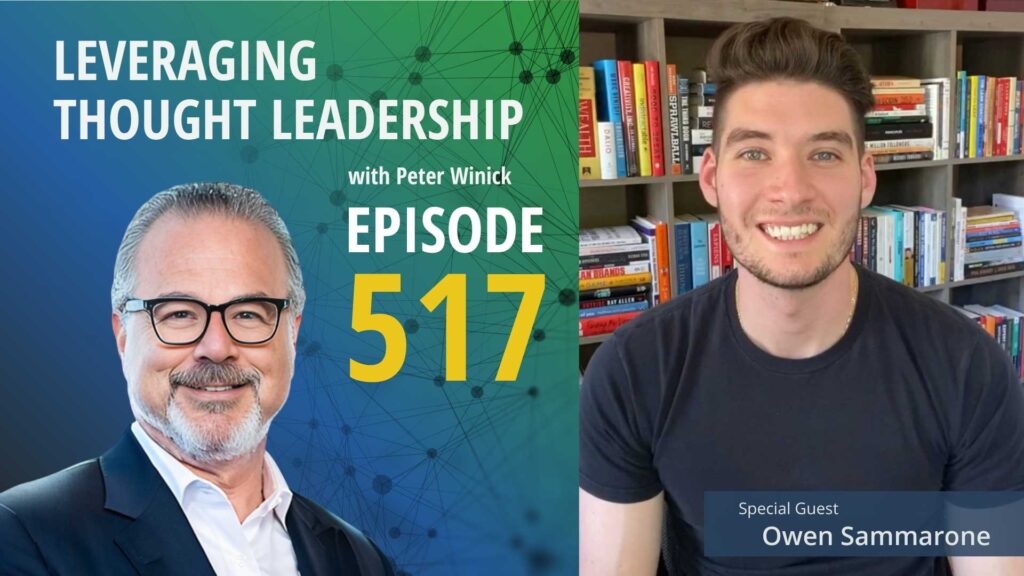
Using thought leadership to follow your passion.
An interview with Owen Sammarone about moving from basketball coach to book influencer.
The road to becoming a Thought Leader is never a straight one. So going from college basketball coach to book influencer might not seem that odd. Still, the map to get there is fascinating!
Our guest today is Owen Sammarone the Founder and CEO of Unleash the Knowledge, LLC; an online, educational community of lifelong learners and avid readers helping authors reach a larger audience.
Having a business based around books you might assume Owen has a background in publishing or marketing, but he was previously a graduate assistance with the UConn men’s basketball program. Owen shares that while he loved basketball his true passion came from the self-development habits of coaches.
Owen began to explore what his coach was reading and listening to, then sharing the takeaways he found on Instagram, nurturing a following of self-development junkies. After Owen was contacted by a heart doctor, seeking to pay for promotion of his new book to Owen’s followers he realized Unleash the Knowledge could be more than an social media platform. IT could become a business model.
Through this episode Owen shares his journey growing his platform and finding his footing as well as tips you can use to grow your own social media platform!
Three Key Takeaways:
- In order to grow a social media platform, you need to create a niche that works for your audience and provides value.
- Certain social media platforms tend to skew towards certain trends or topics. That doesn’t mean you can’t grow a successful audience outside those bubbles if you are dedicated to it.
- Growing a platform requires consistency. You can’t just post when you need something from your audience.
If you need a strategy to bring your thought leadership to market, Thought Leadership Leverage can assist you! Contact us for more information. In addition, we can help you implement marketing, research, and sales. Let us help you so you can devote yourself to what you do best.

Transcript
Peter Winick And welcome, welcome, welcome. This is Peter Winick. I’m the founder and CEO at Thought Leadership Leverage and you’re joining us on the podcast today, which is Leveraging Thought Leadership today. My guest is Owen Sammarone. Owen – Owen’s a fascinating guy I’ve just recently met and he has an interesting back story. He’s got an undergrad is basketball at University of Rhode Island, graduated magna cum laude with a Bachelor of Arts in PR and General Business Leadership Studies. Then he was at UConn Men’s basketball. Any of you in the basketball space? No, that’s kind of Mecca for basketball. But what’s really interesting is he’s been a nerd like me that’s been passionate about nonfiction books and that took him down the path that we’re going to talk to today. So let’s talk about the jock. That’s a nerd. So there’s a contradiction there, right? Give me like, how did this book thing happen? What’s going on there?
Owen Sammarone Yeah, absolutely. Well, Peter, thanks for having me excited for this. Yeah. Most people are like, how do you go from basketball to books? And to be honest, it’s not a crazy transition, as most may think. So yeah. Long story short, I was a student manager at University of Rhode Island, and then I was a graduate assistant at UConn under Danny Hurley. I’m a Jersey guy. He’s a Jersey guy. So I found that kind of home away from home when I was up and roadie. And essentially the experience was amazing. I was trying to be the youngest GM in the NBA. That was the first goal, and then just started to feel what the life could be like for me. I started seeing what the lives were like for the coaches, and for better or worse, it just became a little bit less attractive for me. But what I became to be really what I was gravitating towards was coach’s self-development habits and just his day to day habits, how he was attacking. The day I would go into his office, he had Ryan Holiday, Tim Ferriss books on his coffee table. He was reading blogs, he was listening to Lewis Howes on podcasts, you know, all these things. I was just a sponge for him. And that really just started this like wave of interest and excitement to essentially just know like who I was yesterday doesn’t have to be who I am today and who I am tomorrow can be whoever the heck I wanted to be. So I was just like super excited that I could just change the life I was living. And what’s really interesting about my story is I didn’t even play high school basketball. I was a lacrosse player and somehow I have two rings at the Division One level. We ended Trey Young season my senior year in the March Madness tournament. So I’ve just created this wild life that, like no one ever thought I could possibly do it, which is my message to everyone that really we can create any opportunity we want. But the reason we got into books was the whole idea of following the books that coach was reading. And then I just started sharing the books. I was reading myself and sharing the takeaways on Instagram and named it Unleash the Knowledge, pick the logo. That’s not the logo today. There was an iteration beforehand and started finding this tribe of readers and people that were just self-development junkies. And then that’s grown to stay there.
Peter Winick And this just goes from, you know, you observe some, you know, some folks that you admire as avid readers, lifelong learners, learners, etc. You model that behavior, you start to do it, you start to embrace and you’re like, Well, might as well share some of this, right? So there’s no business plan, no strategy, no matter your motive, let me just share it and see what happens. And now let’s fast forward a couple of years and that’s your business now, right? So tell me what it is you do and who you do it for, because it all the origin stories. Awesome. I love the origin story.
Owen Sammarone Absolutely. The vision was to create a community of readers first and foremost, which I always felt like I lacked, like people that were big thinkers. But then I got about 30,000 followers. A heart doctor reached out and January 2020 and he was like, Hey, man, you got 30,000 followers. They seem like they’re all readers. I just released my first book. It’s kind of like a memoir. Great connection with him. Needless to say, he’s from a town nearby me in Jersey, so we just kind of connected on that and I had no idea what to charge. I no idea what was even going on. So it was a business that popped out of nowhere. And, you know, we struck a deal for like 200 bucks, 250 bucks. I told him I’ll share a couple posts of his book or hype it up or I’ll share my takeaways. And that really just was the aha moment or the light bulb. And that was three months prior to COVID happening in March, which was also the end my last season at UConn. If I were to, you know, my contract was done as a graduate assistant. So it was very serendipitous.
Peter Winick You know, when you talk about COVID. So there’s things that are in you control and things that are out. But consumption went through the roof during COVID because how much time you could spend can you spend locked in the house watching Netflix? So there’s things that there’s luck and then there’s skill, right? That’s always how it goes.
Owen Sammarone Absolutely. It was just you can’t write it up like some of the things that I think that happen in our lives that are so interesting are so pivotal to the life we live today is stuff that you could never imagine. And so that’s really how it got going. One guy reached out. I realized it was a business on my hands, and then I left basketball on my own. Decision could have stayed, but it just wasn’t for me anymore. Went back home to Jersey, lived with Mom and just started reading a ton of books, creating more content for the reader, the follower, and then started having an outbound approach to reach more authors. And 3 to 3 and a half years later, we’re still at it doing a couple other fun things. But, you know, book promotions have been the core piece of some of most of the business now.
Peter Winick Love it. Love it. So, you know, what’s interesting is now it is a vehicle, not the primary vehicle, but it’s another tool for an author to have when launching a book and getting it out there. And what’s interesting is the publishing industry has been around forever, right? The PR industry has been around forever. The book launch of them has so many other players there. Yet you created this really quirky, interesting, cool niche that is a I would say, just another tool in the arsenal for an author to have. You know, they can pay you to optimize or to promote, you know, an upcoming book to your followers. And I think this is a piece that people don’t understand and it’s a very similar strategy to podcasting, is you can go out an author and try to find the world that’s really, really, really, really hard. The more effective ways to say who else has aggregated or put together a large population of people with a higher propensity to like my stuff, right? So anybody can start an Instagram account. Not everybody can get to the number of followers that you have. Anybody can start a podcast. Not everybody can get an audience, right? So I think people need to be deliberate and strategic and say, Ah, okay, who’s done the hard work of building the audience? And all I have to do is be engaging, charming, insightful, whatever to that, to their audience and respectful of their audience.
Owen Sammarone Yeah. And you’re so right. Obviously, you’ve been in this game longer than I have. And you know, a lot of this, a lot of these principles I don’t think have changed. It’s just changed the medium of what we’re using. Like take a Super Bowl commercial, tons of eyeballs, tons of attention. If you have a product for the football fan or the everyday person, like that’s a great place to plant your message. If you’ve got a book and you want to get it in front of readers, I’m probably a pretty good person that you want to engage with. But then again, you know, so you could buy those audiences. I that’s what I kind of that’s a part of the phrasing, like you’re borrowing the credibility or the authority of someone’s brand. I mean, I’m sure you watched the DTC e-commerce just wave of products on TikTok or Instagram as well. These people have audiences that are ready to buy or interested in beauty products or this product or fitness product. So if you have a company with a product that aligns with that audience, why go out and try to hustle to build your own audience? I mean, sure, you should do that in conjunction, but you should also allocate a budget to just getting it in front of those right eyes. So maybe in the past it was newspapers because everyone was getting newspaper on their doorstep and everyone was reading the same paper. So you wanted to put the message in front of them. But now it’s almost easier today because we have like these subset audiences that we can play from. Like if I again, if I have a fitness product, I’m going to go find a bunch of CrossFit guys who have a million followers who I know the people following them are fitness junkies. Like now I know exactly that I’m going to be reaching the right person. So yeah, it’s easy. It’s also harder.
Peter Winick One of the things that’s interesting and you and I talked about it when we spoke a week or two ago is that a lot of authors, thought leaders, etc. need to get out of their own way as it relates to understanding an audience. Right. So many. And maybe it’s an age thing. Maybe who knows, right? There’s lots of reason because, oh, my people aren’t on TikTok, my people are on Instagram, my people are only on LinkedIn. And I think you have to test the waters to say, Really? Is that really true? Right. And yes, painting with a broad, you know, sort of a broad brush, Instagram tends to be more visual. Instagram tends to skew or a little younger. It tends to skew or towards fitness, health, beauty, whatever. But guess what? There are people out there that are looking to read a good book, to look for a good book. And there are fewer people like you that have aggregated that subset on a platform that’s not traditionally, I don’t know, known for thought leadership, shall we say, versus other. Yeah, I think there’s exceptions to all those rules.
Peter Winick If you’re enjoying this episode of leveraging thought leadership, please make sure to subscribe. If you’d like to help spread the word about our podcast, please leave a five-star review at ratethispodcast.com/ltl and share it with your friends. We’re available on Apple Podcasts and on all major listening apps as well as that thoughtleadershipleverage.com/podcast.
Owen Sammarone Absolutely. And I think the other big piece too is building that trust to like for someone to go buy your book, they got to know that you’re the person who’s the expert on that type of material. So a lot of people will try out these social platforms and they’re going to try to speak to everyone which reaches nobody, and they’re going to give up after a few or a few months. Like, you really got to have a deliberate plan to, like, stick with something for six months or a year, stick to the same messaging, to be reaching those folks.
Peter Winick But stay there, Society stay. They are everywhere. No. Oh, and so I think that’s a critical piece in that because we’re able to measure everything literally in real time. I can put a post and then, you know, go there and say in 5 minutes the company people connected within in an hour. You know, I see all the data, whatever. But there’s this this sort of counterintuitive ness to in order to be successful on a social platform, which is all about the dopamine hit and the immediate gratification, whatever, you have to play the long game, you have to have a six month plan. And I’ve seen far too many people, you know, Oh, yeah, I tried that. How long do you try that? Oh, I did three post or I did it for a month or they go on, you know, 17 times a day for a month, like, like obsessive and then nothing. And I like you’re thinking not only because I like to mine, but, I think it’s right that you have to be patient. You have to say, you know, this is a six month play to build that awareness bill, that engagement, and then get to the call to action. We can’t get to that call to action immediately for everything. One post on Instagram doesn’t equal a thousand book sales. It just doesn’t happen that way.
Owen Sammarone Right. And, you know, I’m a big like, I love reading startup stories from the early days and even my own growth on Instagram, like it was probably three months where it was, you know, 0 to 10. Okay. It was it was a, you know, decent subset of time for me to really get things going. But then you hit that compounded factor, you hit that tipping point, and then things start rolling and rolling. I think the other thing to note, too, is everyone kind of sees the grand card zones of the Gary vs of the toy robins and sees like all their stuff. Well I’ll be the first to say it. One, they’re obsessed and they’re working on this every single day. Secondly, they have a full team of marketers and social media people behind them helping them create content. But third. They are pumping an obscene amount of paid dollars into boosting their posts that you’ve never seen before. So everyone kind of sees their post. Oh, my gosh, it’s organic. They’ve built this million person followers.
Peter Winick Well, but add the four pieces. Add the fourth, though. Each and every one of them have a portfolio of product offerings and services that are very, very, very high margin books aren’t. So part of the rush look for an author is. However you look at that, whether it’s time, money, energy, whatever, at best, whether you’re self-published or whatever, you’re going to make a few dollars a book. Usually the book is not the thing. It’s the pre think to the next thing. But you have to you know, you can’t spend hundreds of dollars on a customer acquisition cost per every book sale of 1995. So there’s some math problems there as well. And I think that you’re right, when people look at a Gary or a grant or a Tony, first of all, they’re at it. For years. They have probably invested tens, if not hundreds of millions of dollars over the years building that brand. The team that you talk about, some of them are the dozens to hundreds supporting those people. Right. So don’t compare yourself with that many people all the time. Say, oh, yeah, I want to be like Tony Robbins. Okay, You realize he’s at this for 40 years. Like, okay, you’re in month three. So that is, you know, like me going out to buy a basketball today and comparing myself to LeBron, like, it’s just not going to. Right.
Owen Sammarone Right. Yeah. It’s a simple, you know, chapter one comparison to chapter 95. We want to go down the book route. And I don’t know if you’re going this route, but it’s a great point that you’re making that these guys don’t even care for the book sales like Gary, these pushing. I mean, he did the whole thing with his recent book, The 12 and a Half whatever, so you could sell those. And it’s massive project. Tony Robbins, he just wants you into his 5000, 10,000, $15,000 business mastery or 124. Yeah. Like these like it’s a big mindset shift that I some authors already get it and I love it and we do great work together. Others it’s kind of a conversation we have to have. But if anyone’s listening here, listen, we want to sell books. That’s still a focus. But the book, like you said, is the first. It’s the first step. It’s the first tool. It’s a vehicle. You really want to see this further beyond the book. You want to see yourself as a book.
Peter Winick Also, for 99% of authors, the book cannot be the tail that wags the dog. You have to have that strategy in place and the business model in place to say, Ah, yes, of course I want to sell book. Yes, I’m proud of the book. Yes, it’s a high quality book. Don’t fall for one of these book in an hour. Nonsense. I mean, you have to put a high quality book out there. But one of the outcomes of the book is to build the business. What is that business? Is it consulting? Is a digital is advisory? Is it, you know, is it a series of apps, assessments, whatever it is, How does one lead to the other? That’s a strategy issue. And too many authors sort of ignore that or start thinking about that after the book is published, which a little bit too late. So before we wrap, I just want to spend a minute or two because I think I’d be remiss if I didn’t say, okay, so give us a few tips. I don’t want the three hacks because I’m not a believer in that. But someone’s out there now, they’re an author and they’re thinking, Geez, okay, I kind of get this. This is interesting. What might I do tomorrow to start myself on the road to, you know, being successful. However, I define that on social.
Owen Sammarone Yeah, I think first and foremost, you got to be really clear on who you’re trying to reach. I think you really need to understand who your audience is, that ideal reader. A lot of people, you know, again, it’s for better or worse, they’re telling me the reader is everybody. And sure, maybe a ton of people can read your book, but let’s get a little specific and just have an understanding of who this person is. What are their psychographics, pains, problems, goals, desires? What? What job are they in? Are they a middle manager and SAS company who’s looking to grow their book of business? Like, let’s get a little bit more specific and then have a diligent plan to kind of go find those people. It’s super easy to find those business folks on LinkedIn. You can just search it on the search engine and start kind of connecting with those folks. So the first piece is really to find that ideal reader. I call it reader research. Secondly is to is to really have a plan of what platform suits you best. I’m not going to say get on every platform. If you’re a visual person you like, be on camera. There may be a YouTube, Instagram or TikTok’s. Good for you. But honestly, my message in the past like six months has been go to LinkedIn. I really think LinkedIn is a powerful platform. It’s written based, it’s also visual based, and you can like legitimately transact on the business or book cause I mean, I’ve done it. You’ve done it like it’s definitely doable. So I would get clear on where are my potential customers, but also find that like thousand true fans, if you’ve ever talked about the Kevin Kelly famous blog, but it’s not about finding the million people to sell, to just find the 1000 people that could, you know, really latched your content and then ideally get them into an email list because that’s the other piece to really discuss, you know, length. We won’t do it here, but to post on social, it’s really just to capture the massive net to get a bunch of fish in. But then you really want to get people into your email list where you can nurture them or stay more in touch with them or share more, you know, actionable advice. So, you know, share a freebie.
Peter Winick Share everything about. It’s a beautiful thing about the email list, right? Let’s say you go fishing on LinkedIn for lack of a better term, right? And now you’re getting people in that email. You have control because even whatever you post on LinkedIn, the statistical odds of the right people seeing it at the right moment are still pretty slim. You have control over your newsletters and your communications there. And I also think there’s this habit that authors could fall into of they go silent and then they need something, right? A book comes out, this comes out, whatever. And then they’re like, Well, they’re all over you. They’re everywhere. Versus if you’re constantly dripping high quality content and sharing what you’re doing, whatever in between the times and you need them, you have to be generous and be giving your ideas and your stuff away so that when you need something, you know, it’s either five or ten gives you an ask. Right. And too many authors that I don’t hear from you at all. And then obviously you’re asking me for a bunch of stuff and I’m like, well, that’s just like a little icky. I don’t like that.
Owen Sammarone And the true, in my opinion, the true constant between people like a Tim Ferriss or James Clear say is they have a large email was that they, Robin Sharma, that they build that they’ve been building this email list for years and years and years. Yes, they’re on social.
Peter Winick But not distributed. But, but I think the other thing is you can build it, but you need to consistently connect and communicate those people via emails. Monitor your open rates. Everything’s a test, right? So, you know, you mentioned before, if you’re comfortable with video, do video. I would say the opposite. If you’re not comfortable with video, do video. Why? Because there’s a subset of audience that would like to see you on video. Get over what you might perceive as the awkwardness of it. Or I don’t like the sound of my voice or whatever or whatever, but I think you need to test other modalities. And you’d be surprised to see the response or the difference in the metrics on things like open rates and click throughs and all that sort of fun stuff.
Owen Sammarone Definitely. No, I could stand by that too. You know, I think it’s really I think it all comes back down to trust. You’ve got to build trust in the way you could do that is by being a person of value, showing up every day or consistently. I mean, a guy like remits 80, I’m getting like 80 miles from home a day, and now he’s got the Netflix special and he’s got the whatever. Like, you know, I read his book. His book is good and I trust the guy’s finance knowledge. Is he a finance guy? Not at all. He’s a marketing psychology master’s student from Stanford. Like, he’s a marketer at the end of the day. But I’m learning. I’m listening to him about my target fund, retirement funds and etc.. Like, it’s incredible. So I think, you know, that’s the over that’s the umbrella. You’re trying to build trust, and you could do it through a couple of ways, but I would say pick a platform that suits you, understand who your reader is. Be there every day, but then move them into an email list and don’t let them go dry like you’re saying. Stay in touch because you’re going to need them. And when you need them, hopefully you’re just not coming out of the woodwork. You know, after six months of being dark, you’re actually been president.
Peter Winick Well, this has been great. I appreciate your time so much. Knowledge and information. Hero and love it. Thank you so much for spending some time with us today.
Owen Sammarone Thanks for having me, Peter.
Peter Winick To learn more about thought leadership leverage, please visit our website at thought leadership leverage dot com to reach me directly. Feel free to email me at Peter at thoughtleadershipleverage.com and please subscribe to Leveraging Thought Leadership on iTunes or your favorite podcast app to get your weekly episode automatically.


